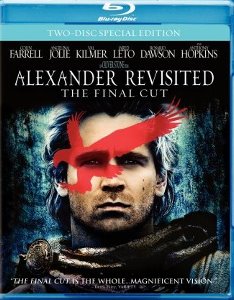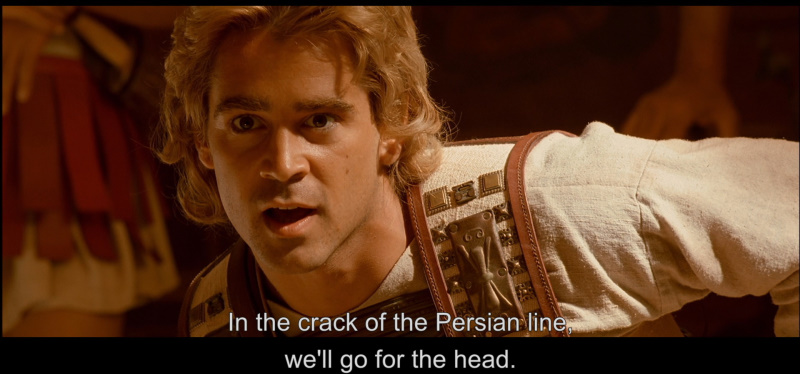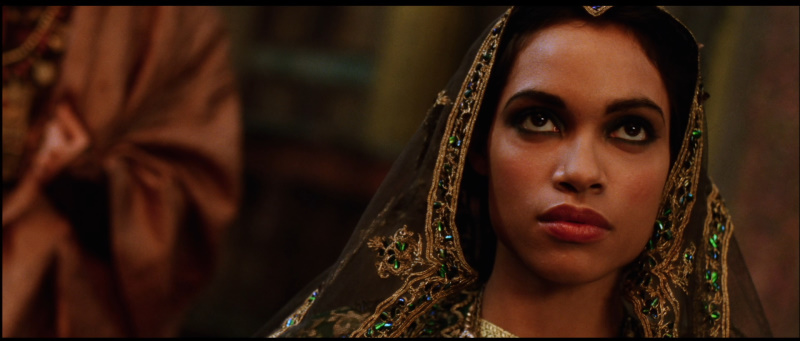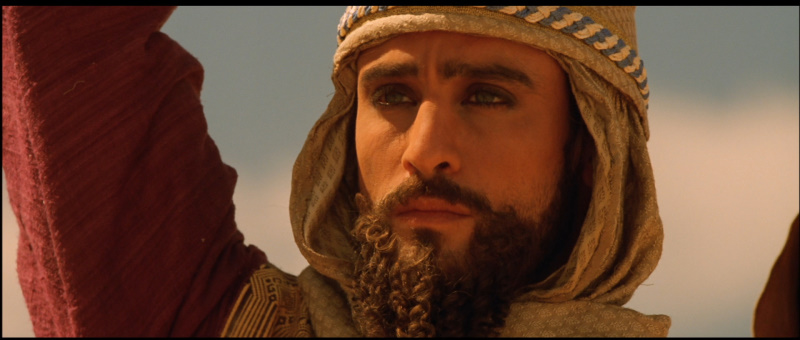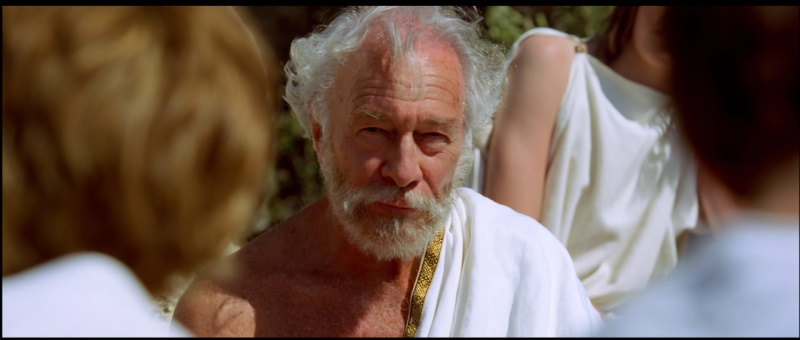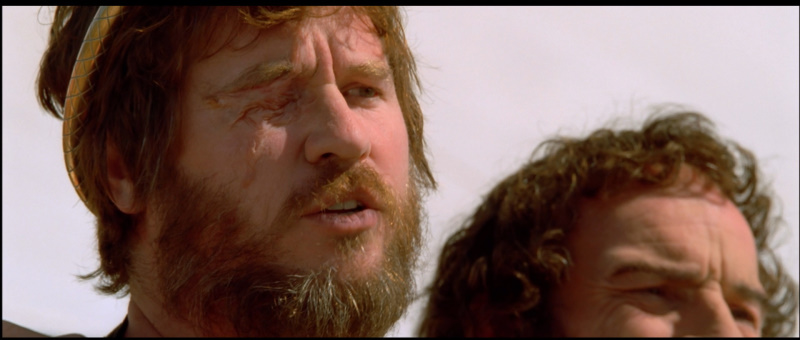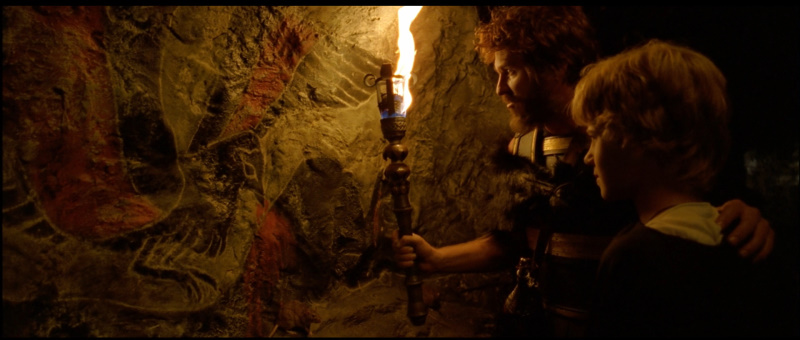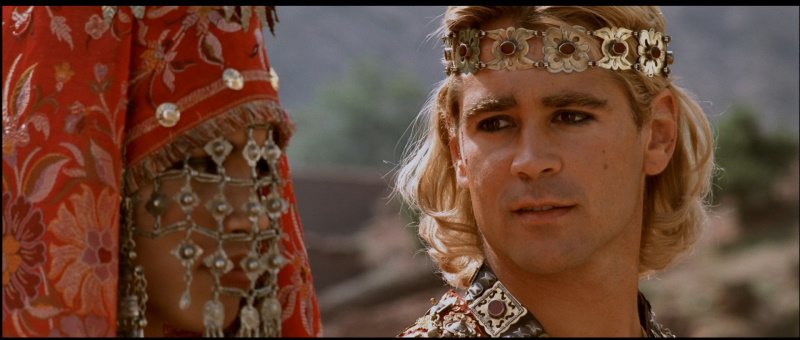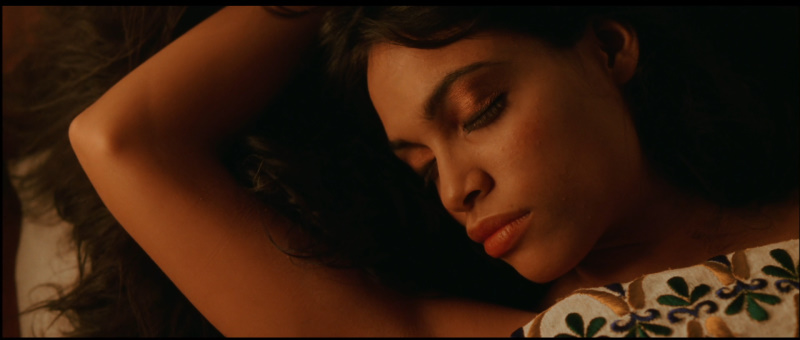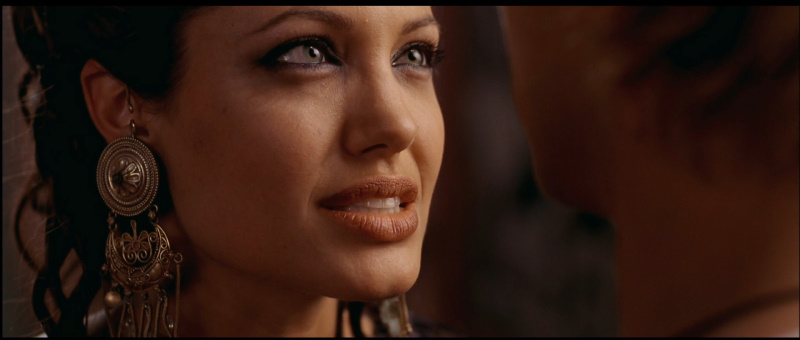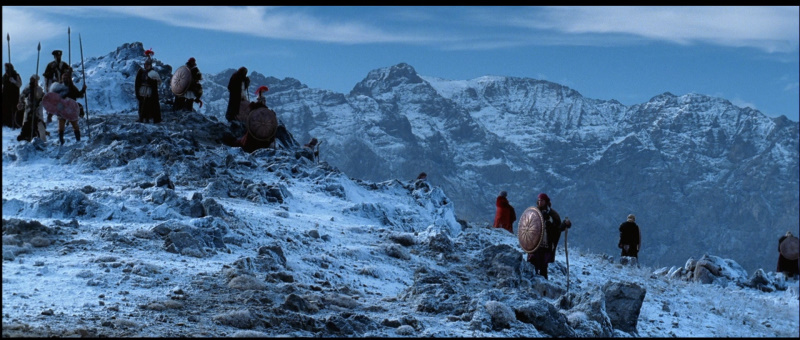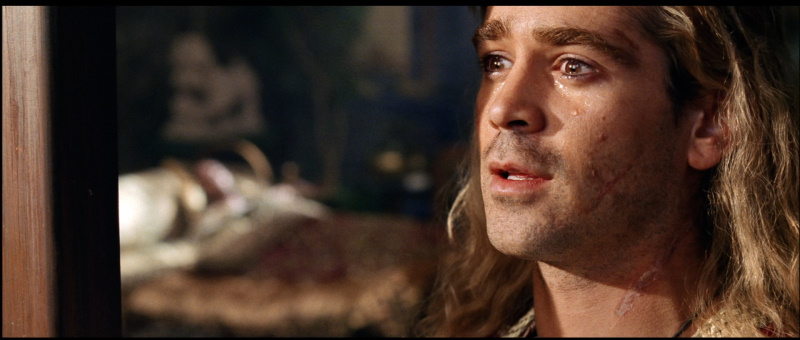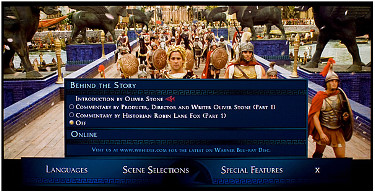Alexander Revisited: The Final Cut BRD
(Oliver Stone - 2004 / 2007)
Studio: Warner & Intermedia Pictures (USA) / Warner Home Entertainment (USA)
Video:
Aspect ratio: 2.40:1
Feature film: 1080p / VC-1
213 minutes
Supplements: HD/SD
2 discs
Audio:
English DD 5.1
Subtitles:
English, English SDH, French & Spanish
Extras
• Commentary by Director Oliver Stone*
• Commentary by Historian Robin Lane Fox*
• Feature-length making-of documentary: Fight Against Time
• Featurette documentary: Resurrecting Alexander
• Featurette documentary: Perfect is the Enemy of the Good
• Featurette documentary: The Death of Alexander
• Featurette: Vangelis Scores Alexander
• Theatrical trailers
* (exclusive to the HD edition)
49 chapters over 2 discs
Standard Blu-ray case, 2 discs
Release Date: September 18, 2007
Alexander Revisited: The Final Cut ~ Comment
Not being a great fan of Colin Farrell and having read the summaries of reviews of the original theatrical release in late 2004, I passed on Oliver Stone’s epic drama about the man who may have been the “greatest” of the “Greats.” Now, 3 years later, this new Blu-ray edition – “Alexander Revisited: The Final Cut” – is being touted as an improvement over the original. A disproportionate number of “director’s cuts” are not much more than excuses to resell the title in a new package, but some, such as Amadeus and The Last Emperor, are actual improvements. The same, I suspect, could be argued for this new edition though, even without having seen the prior version, I can say with confidence that certain basic problems remain.
Alexander died at the age of 33 in 323 B.C. - 825 years after Achilles met Hector at Troy, 167 years after the “300” defended the pass at Thermopylae, and almost 300 years before Julius Caesar was assassinated in the Roman Senate. It is said that at his death, Alexander had conquered and occupied more of the planet (some 2,000,000 square miles, as someone points out in the film – though how he would know that I can't say!) in less time than anyone before or since. Caesar was arguably the better general: he certainly had a harder time of it, since he was not already ruler of Rome at the time of his various conquests and he needed to organize naval support in ways that Alexander didn’t. On the other hand, much of the territory that Alexander invaded was relatively unknown to people of his ilk, as Stone makes abundantly clear when he first sees the jungles of India – it's "monkey tribes" and its elephants.
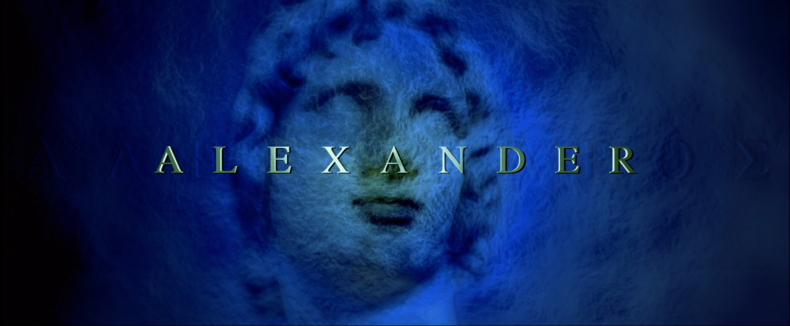 |
My main complaint about the movie, which even this extended version does not address, is that we never get to see the effects of Alexander's intention. Alexander speaks of his dream often – of how he wanted to continue his father's conquest of the East. We certainly see the extent of his dominion, but we do not see that which he claims is the point of all this: to turn Asia into a kind of Euro-Asia, a pan-Hellenic culture, where all people speak with one voice or at least without prejudice or slavery (or so Stone depicts him). We hear references to his founding a number of Alexandrias - which, in fact, happened - but what they were about, in almost four hours of film, we are not told. Yet, more than the speed with which Alexander conquered his opposition and the fact that his armies were never defeated, it is for this that he is remembered. After Alexander, western civilization was inexorably altered. Stone doesn't go there, thus shortchanging Alexander's own dream and making his fall that much less tragic.
The casting is generally satisfactory, especially the women and Alexander's male lovers, Hephaistion (Jared Leto) and Bagoas (Francisco Bosch). Farrell is awful at first as he leads his men into battle in Babylon – I wouldn't follow him in line at to have my driver's license renewed – but he grows into the part. He is certainly convincing as a youthful, exuberant successor to Philip's ambition to conquer the east, but as a successor to his own personal hero, Achilles, he just doesn't cut it. It doesn't help that he is dwarfed by both helmet and horse. For the first hour or so, I felt like I was watching a Tony Roberts trainee in personal management. He is not helped by a script that even the redoubtable Anthony Hopkins (Ptolemy) is able to make bearable, especially in his opening monologue. On the other hand, Farrell is achingly compelling as his personal life crumbles which, as luck would have it, is a sizable chunk of the movie.
Stone dives into the homoerotic aspects of the story with relish. I was reminded of the orgy put on by Clay Shaw/Bertrand (Tommy Lee Jones) in Stone's JFK, where it struck me as out of place. But here, and especially as Alexander devolves into feverish paranoia, it is all as it should be. That said, it was interesting to note in Robin Lane Fox's commentary that such homoerotic relationships were common among the youth at that time, but – Fox is quick to observe - as a phase that would pass onto a mature friendship. Fox seems to think that Stone (for whom he was the historical advisor) "got it right." Perhaps he was speaking very generally, because there is no question that though Hephaistion remains loyal and faithful to Alexander even after he is dumped - first for Bagoas and then for Eastern woman who becomes his wife – he, Hephaistion, is the mature one, despite his pining; and that Farrell's Alexander, despite his marriage, remains the very poster child for the fixated oral male: acquisitive and insatiable. Freud would have loved him.
Alexander Revisited: The Final Cut ~ The Score Card
The Movie : 6
The movie opens with the death of Alexander, then on to a prologue by Ptolemy (Anthony Hopkins) some 40 years later. The movie, proper, is told in a series of intercutting flashbacks as Ptolemy dictates Alexander's history, and so provides the occasional voiceovers that glue the pieces of the narrative together. After a time it becomes clear that there are really only two time frames (excluding Ptolemy), each moving forward: The first begins with Alexander's boyhood in Macedonia, where his mother and father vie for his affections and loyalty. His mother, Olympias (a serpentine Angelina Jolie), is a sorceress of Dionysus; she insists to the boy that his father is Zeus, and not the rapist, Philip, who claims the throne. Philip (a one-eyed Val Kilmer) tells the boy about the legendary and mythological heroes of their people, but is non-committal about his son's future as his successor, but Alexander is liked and admired by all, and so succeeds his father on his death.
The other time frame begins with Alexander's later conquest of Mesopotamia and his relentless pursuit of Darius. Even after catching up with Darius, he turns to exterminating all potential pretenders to his provenance as king of all Asia – or, at least, all of it that he is able to get to before his army is eventually ravaged by years of campaigns on foreign soil. He, himself, falls victim to (perhaps justly deserved) paranoia in regards his own generals who complain that their army is gradually being replaced by Asians.
Image : 9 (8~9/10)
NOTE: The below Blu-ray captures were taken directly from the Blu-ray disc.
The score of 9 indicates a relative level of excellence compared to other Blu-rays. The score in parentheses represents: first, a value for the image in absolute terms; and, second, how that image compares to what I believe is the current best we can expect in the theatre.
High definition DVD, perhaps unfairly, and certainly cruelly, invites us to be more critical about picture quality in ways that the theatrical presentation does not. The image quality here varies from scene to scene, as does the original film. I suspect that the image quality is just a tad better than Troy in respect to the transfer, though more inconsistent because of the original elements.
CLICK EACH BLU-RAY CAPTURE TO SEE ALL IMAGES IN FULL 1920X1080 RESOLUTION
Audio & Music : 9/9
What with all the battle scenes, we need a sound mix that conveys the din, the weight, and the mania while managing the supporting musical score and the occasional bits of dialog within. Major points here. In other scenes, there is lots of space, bass and delicacy by turns. The music by Chariots of Fire Oscar winner, Vangelis, is properly evocative, whether in the martial sequences or the dance or in moments, rare though they were, of tenderness.
Operations : 8
One thing I appreciate about Warner Home Video, especially as compared to Disney, is how directly we get right to the business at hand. Before we know it, the movie begins – no previews or Blu-ray ads. Kudos. The menu is straightforward, simple, easy to understand. As is typical with Warner Blu-rays, the slightly expanding thumbnails are not titled. In a way, it's nice to have so many chapters, but unless you know the movie very well, many of the thumbnails could as easily refer to one scene as another.
Extras : 8
The two commentaries are newly recorded for this edition and are not, therefore, the same as those for the SD; otherwise, most of the prior editions' extras features show up here. These include a roughly 90 minute documentary made by the director's son, Sean, who gives us a fair and probing behind-the-scenes look at the production. Sean also provides a second (and new) docu-featurette, well over an hour, which investigates frankly other aspects of production. The two new commentary tracks by Stone and Fox are both excellent for what each brings to the listener. Stone is a passionate and honest observer of his own work and very much worth listening to no matter how you feel about the merits of the film (we learn by our mistakes); Fox is perhaps a little too close to the project for which he was the historical advisor and sometimes comes off as genuflecting, but we have to assume his comments about ancient practices is as accurate as we can know at present. The score of 8 is downgraded only for the features not being in HD.
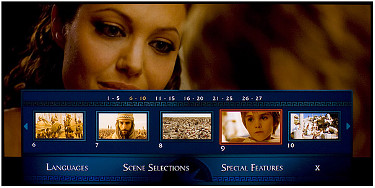 |
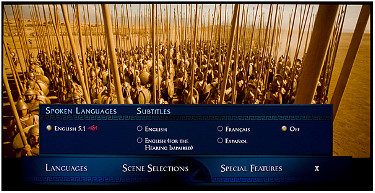 |
|
|
|
Recommendation: 7
Even if you are not a fan of this movie – and I am not – I found the supplementary features an excellent critical examination of the movie making process. If you are a fan, this is the version to get.
Leonard Norwitz
LensViews
September 30th, 2007


